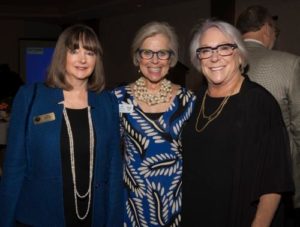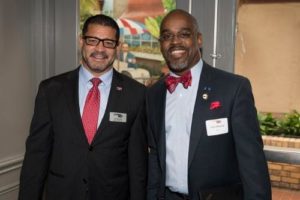As with other events nationwide, the second and third luncheons in Project 180’s annual lecture series were postponed due to the pandemic. With high hopes and great optimism, we originally intended to pick up again this Friday, June 12. Clearly, that goal was too enthusiastic.
We began celebrating Second Chance employers on March 6th with The Honorable Kimberly C. Bonner and keynote speaker Felix Massey. We look forward to continuing the series on the dates listed below.

The Honorable Kimberly C. Bonner (left) Chief Judge, 12th Judicial Circuit Speaker. Roxie Jerde President/CEO, Community Foundation of Sarasota County Breaker of Chains Sponsor. Sherry Koski, The Koski Family Foundation, Breaker of Chains Sponsor.

Joe Malave Project 180 Board of Directors (left) Raymond James Breaker of Chains Sponsor. Felix Massey Keynote Speaker, March 6, 2020 Society for Human Resource Management.
Remaining lectures for “Celebrating Second Chance Employers”
Please join us on
October 9 for a panel discussion with Second Chance employers and employees
November 13 to hear Dave Dahl, keynote speaker. Founder and former owner of Dave’s Killer Bread
All other information for the series remains the same:
Location: Michael’s on East, 1212 East Ave., Sarasota
Time: Doors open at 11:00 for registration and networking; luncheon begins promptly at 11:30 am and ends at 1:00 pm
Tickets: Tickets are $35 each and include lunch. Secure tickets here
Already purchased tickets for the April 3 luncheon? They’ll be honored at the October 9 panel discussion*
Tickets already purchased for May 8 will be honored at the November 13 lecture*
*If you need to make other arrangements concerning your tickets e.g., you bought tickets for April 3 and can’t make October 9, please let us know by contacting us at barbara@project180reentry.org.
A Message from the CEO
Project 180’s Strong Voices lecture series educates our community about issues associated with prisoner reentry.
Unsuccessful reentry is closely associated with social ills that affect us all. When unable to find housing or employment, a reentering citizen is likely to slide into homelessness and residential instability, poverty, and unemployment, contribute to public health concerns, and engage in criminal activity.
Successful reentry results in an individual who pays taxes and abides by the law, supports himself or herself and a family. Successful reentry takes all of us and those at the center of success are the landlords who house and the employers who employ returning citizens.
During this lecture season, we express our great appreciation to local employers who understand that everyone needs a second chance at a better life. We hope you’ll join us in celebrating their dedication to keeping our streets safer and their compassion in helping motivated citizens turn their lives around.
Wishing you well,
Barbara Richards
Project 180

 Our goal is to reduce the impact of repeat offenders upon public safety, public spending, Florida families and individual lives.
Our goal is to reduce the impact of repeat offenders upon public safety, public spending, Florida families and individual lives.